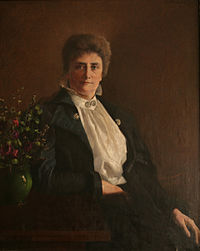Gina Krog
| Gina Krog | |
|---|---|

Gina Krog painted by Asta Nørregaard. The painting is owned by the Norwegian Association for Women's Rights
|
|
| Born |
Jørgine Anna Sverdrup Krog 20 June 1847 Flakstad |
| Died | 4 April 1916 (aged 68) |
| Nationality | Norwegian |
| Occupation | Editor, teacher and politician |
| Known for | Feminist pioneer |
Gina Krog (20 June 1847 – 14 April 1916) was a Norwegian feminist pioneer, teacher, liberal politician and editor. She played a central role in the Norwegian women's movement from the 1880s until her death, notably as a leading campaigner for women's right to education and the right to vote. She founded the Norwegian Association for Women's Rights together with liberal MP Hagbart Berner.
Jørgine Anna Sverdrup Krog was born in Flakstad, Lofoten as the daughter of parish priest Jørgen Sverdrup Krog and Ingeborg Anna Dass Brinchmann. After her father's early death she lived with her mother in Karmøy until she was eight years old, and then moved to Christiania. In Christiania she attended a school for girls. She later worked as an autodidact teacher in private schools for several years, until 1880. Through her brother she was aunt of writer Helge Krog, and sister-in-law of Cecilie Thoresen Krog.
She was also among the first women to go hiking in the mountains of Jotunheimen, which gave her a reputation as "mountaineer".
In 1880 Gina Krog travelled to Great Britain, where she stayed a while at the Bedford College, and made contacts with the National Union of Women's Suffrage Societies and the leader of the organization Millicent Garrett Fawcett. Back in Norway she started writing newspaper articles, first under pseudonyms, and later under her own name. She belonged to the radical feminists, demanding full equal political rights between women and men, contrasting the more moderate feminists who focused on the improvement of women's financial conditions. She proclaimed the women's right to vote on equal conditions as men, without compromise. This point of view came to be a disputed issue within the feminist movement of the time.
...
Wikipedia
